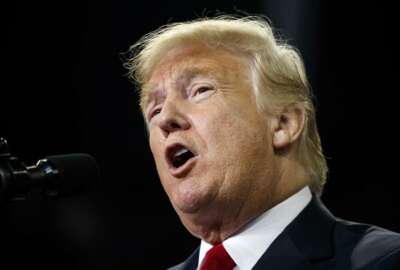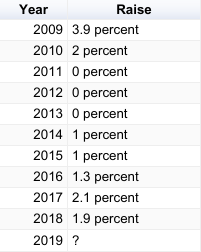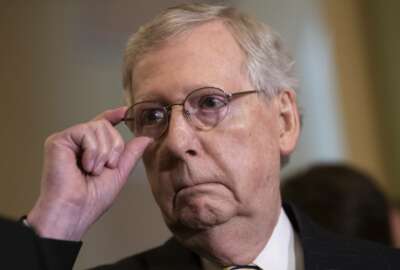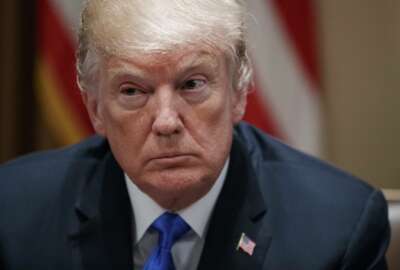
4 things you should know about your federal pay raise, or freeze
The president has a deadline that's fast-approaching. President Donald Trump must make a determination on federal pay by Aug. 31.
UPDATE: Aug. 30, 2018: Trump gives word on federal pay for 2019
An important deadline is fast-approaching, and it often dictates what federal employees can expect to find in their paychecks for the following year.
We don’t know definitively what the president will propose by the month’s end, but here’s what we do know about the federal pay raise and where it stands for 2019.
1. Trump has proposed a pay freeze
President Donald Trump’s 2019 budget proposal recommended a pay freeze for federal civilian employees in 2019, citing the long-term fixed costs of across-the-board raises.
The Trump administration has said it sees its proposed workforce fund as a way to alleviate the impacts of a pay freeze. But neither the House nor the Senate have indicated they plan to develop and set aside resources for this workforce fund, at least not during the appropriations process. In its administrative statement, the White House said it looked forward to working with Congress to enact authorizing legislation to establish the President’s Management Council Workforce Fund.
Members of the military, however, are set to receive a 2.6 percent raise, the largest pay increase in nine years.
2. Aug. 31 is the deadline
The president has until Aug. 31 to make a determination on federal pay. In recent years, both Trump and President Barack Obama have waited until the last day possible — often late in the afternoon — to issue their federal pay plans.
For those who are curious, Aug. 31 this year falls on a Friday before the long Labor Day weekend. Use that information to make your own predictions over the timing and substance of a forthcoming announcement.
If and when the president does make a pay announcement for 2019 later this month, it doesn’t mean the determination is a done deal.
Obama in late December changed his original pay plan for civilian employees and directed agencies to give civilian employees a raise that matched that of the military for 2017.
Congress, as described below, could also change the president’s plans.
3. The president’s plan will be an ‘alternative’
An annual across-the-board pay adjustment formula in the Federal Employees Pay Comparability Act typically sets raises for most federal employees under the General Schedule.
But most presidents rarely choose to follow these formulas, and they often propose an “alternative” pay plan. Federal statute gives the president, for reasons of “national emergency or serious economic conditions affecting the general welfare” to submit an alternative plan to Congress.
That’s what presidents have been doing for years, and what Trump will likely submit by the month’s end.
History of Average Federal Pay Raises: 2009-2019

Click here for a refresher on how government typically calculates federal pay — or here for a recap on locality pay.
4. Congress is divided over federal pay for 2019
The Senate in early August passed a 1.9 percent pay raise for civilian employees for 2019, which it included in its version of the financial services and general government appropriations bill. The 1.9 percent raise is in line with what civilian employees received this year.
The House, however, has stayed silent on the issue of federal pay and have made no determination on the topic.
What comes next? In theory, the House and Senate should conference and sort through the differences between their respective appropriations bills, and the issue of federal pay is one of those differences lawmakers will need to resolve.
Ultimately, Congress could choose to move forward with the Senate’s proposed 1.9 percent raise for civilian employees. Or, it could choose to stay silent on the matter, as the House has done to this point.
If Congress does choose to include a pay raise in an appropriations bill, both chambers must approve the conference report and send it the president for his signature.
It’s still unclear whether Congress will in fact conference over the financial services and general government appropriations bill, much less any of the 11 other appropriations bills. It may be more likely that congressional leaders push an omnibus spending package in September, and it’s unclear whether lawmakers would choose to make their own determination on federal pay in a hypothetical, catch-all bill.
Congress could pass stand-alone legislation authorizing a federal pay raise for 2019, but this would be unlikely. Rep. Gerry Connolly (D-Va.) and Sen. Brian Schatz (D-Hawaii) have again re-introduced the Federal Adjustment of Income Rates (FAIR) Act in January. The bill calls for a 3 percent raise for federal employees next year.
Copyright © 2025 Federal News Network. All rights reserved. This website is not intended for users located within the European Economic Area.
Nicole Ogrysko is a reporter for Federal News Network focusing on the federal workforce and federal pay and benefits.
Follow @nogryskoWFED







